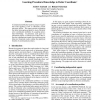Free Online Productivity Tools
i2Speak
i2Symbol
i2OCR
iTex2Img
iWeb2Print
iWeb2Shot
i2Type
iPdf2Split
iPdf2Merge
i2Bopomofo
i2Arabic
i2Style
i2Image
i2PDF
iLatex2Rtf
Sci2ools
117
click to vote
IJCAI
2001
2001
Learning Procedural Knowledge to Better Coordinate
A fundamental difficulty faced by groups of agents that work together is how to efficiently coordinate their efforts. This paper presents techniques that allow heterogeneous agents to more efficiently solve coordination problems by acquiring procedural knowledge. In particular, each agent autonomously learns coordinated procedures that reflect her contributions towards successful past joint behavior. Empirical results validate the significant benefits of coordinated procedures.
Fundamental Difficulty | Heterogeneous Agents | IJCAI 2001 | IJCAI 2007 | Paper Presents Techniques |
Related Content
| Added | 31 Oct 2010 |
| Updated | 31 Oct 2010 |
| Type | Conference |
| Year | 2001 |
| Where | IJCAI |
| Authors | Andrew Garland, Richard Alterman |
Comments (0)

